Related Research Articles
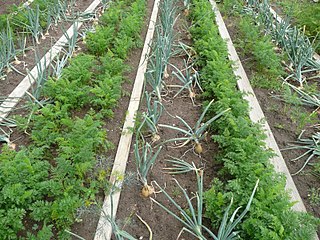
Companion planting in gardening and agriculture is the planting of different crops in proximity for any of a number of different reasons, including weed suppression, pest control, pollination, providing habitat for beneficial insects, maximizing use of space, and to otherwise increase crop productivity. Companion planting is a form of polyculture.

Insecticides are pesticides used to kill insects. They include ovicides and larvicides used against insect eggs and larvae, respectively. The major use of insecticides is in agriculture, but they are also used in home and garden settings, industrial buildings, for vector control, and control of insect parasites of animals and humans.
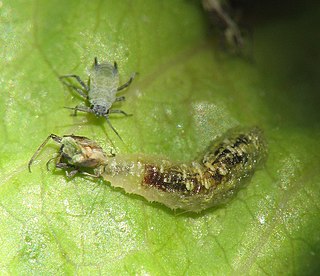
Biological control or biocontrol is a method of controlling pests, whether pest animals such as insects and mites, weeds, or pathogens affecting animals or plants by using other organisms. It relies on predation, parasitism, herbivory, or other natural mechanisms, but typically also involves an active human management role. It can be an important component of integrated pest management (IPM) programs.
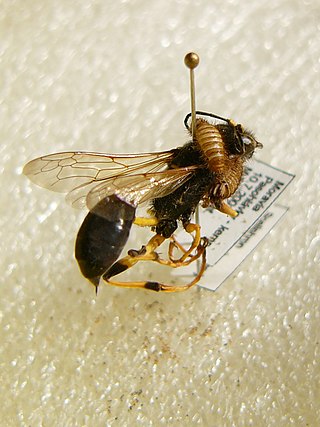
A pest is any organism harmful to humans or human concerns. The term is particularly used for creatures that damage crops, livestock, and forestry or cause a nuisance to people, especially in their homes. Humans have modified the environment for their own purposes and are intolerant of other creatures occupying the same space when their activities impact adversely on human objectives. Thus, an elephant is unobjectionable in its natural habitat but a pest when it tramples crops.

In agriculture and horticulture, a beetle bank is a form of biological pest control. It is a strip, preferably raised, planted with grasses and/or perennial plants, within a crop field or a garden, that fosters and provides habitat for beneficial insects, birds, and other fauna that prey on pests.
Intercropping is a multiple cropping practice that involves the cultivation of two or more crops simultaneously on the same field, a form of polyculture. The most common goal of intercropping is to produce a greater yield on a given piece of land by making use of resources or ecological processes that would otherwise not be utilized by a single crop.
Warwick HRI was a United Kingdom organisation tasked with carrying out horticultural research and development and transferring the results to industry in England.
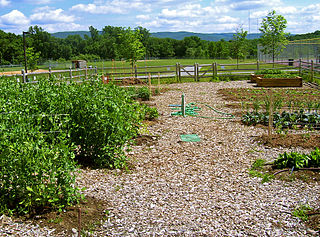
Organic horticulture is the science and art of growing fruits, vegetables, flowers, or ornamental plants by following the essential principles of organic agriculture in soil building and conservation, pest management, and heirloom variety preservation.
The International Centre of Insect Physiology and Ecology is an international scientific research institute, headquartered in Nairobi, Kenya that works towards improving lives and livelihoods of people in Africa.
Economic entomology is a field of entomology, which involves the study of insects that benefit or harm humans, domestic animals, and crops. Insects that pose disadvantages are considered pests. Some species can cause indirect damage by spreading diseases, and these are termed as disease vectors. Those that are beneficial include those that are reared for food such as honey, substances such as lac or pigments, and for their role in pollinating crops and controlling pests.

A beneficial weed can be an invasive plant that has some companion plant effect which is edible, contributes to soil health, adds ornamental value, and as well as beneficial also. These plants are normally not domesticated. However, some invasive plants, such as dandelions are commercially cultivated in addition to growing in the wild. Beneficial weeds include many wildflowers, as well as other weeds that are commonly removed or poisoned. Certain weeds that have obnoxious and destructive qualities have been shown to fight illness and are thus used in medicine. Reductions in abundances of weeds which act as hosts may affect associated insects and other taxa which are beneficial. For example, Parthenium hysterophorus which is native to Northern Mexico and parts of the US, has been an issue for years due to its toxicity and ability to spread rapidly. In the past few decades though research has found that Parthenium hysterophorus has been used in traditional medicine to treat inflammation, pain, fever, neurological disorders and diseases like malaria dysentery. It is also known to create Biogas that can be used as a bioremediation agent to break down heavy metals and other pollutants.
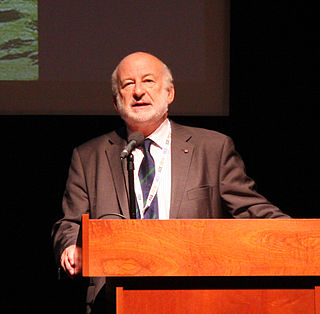
John Anthony Pickett is a British chemist who is noted for his work on insect pheromones. Pickett is Professor of Biological Chemistry in the School of Chemistry at Cardiff University. He previously served as the Michael Elliott Distinguished Research Fellow at Rothamsted Research.

The Indian Institute of Horticultural Research (IIHR) is an autonomous organization acting as a nodal agency for basic, strategic, anticipatory and applied research on various aspects of horticulture such as fruits, vegetable, ornamental, medicinal and aromatic plants and mushrooms in India. The institute has its headquarters in Bengaluru, Karnataka, India and is a subsidiary of Indian Council of Agricultural Research (ICAR), New Delhi, under the Ministry of Agriculture and Farmers' Welfare. It recently has been ranked 1st for the combined years 2019-20 and 2020–21 by the ICAR.

Ebenezer Oduro Owusu is a Ghanaian entomologist and university administrator who served as the Vice Chancellor of the University of Ghana from 1 August 2016 to 31 July 2021. In this role, he was the principal academic and administrative officer of the university. Owusu is a professor of entomology at the Department of Animal Biology and Conservation Science and prior to his appointment as vice-chancellor, he was the provost of the College of Basic and Applied Sciences at the University of Ghana. He is the current president of the Presbyterian University College.
Sarah Wanless is a British animal ecologist. She is an expert on seabirds; she is a Fellow of the Royal Society of Edinburgh and is Honorary Professor at the Universities of Glasgow and Aberdeen.
Angharad M. R. Gatehouse is an entomologist in the UK. Gatehouse is Professor of Invertebrate Molecular Biology at Newcastle University, is on the Council of the International Congress of Entomology, and is the Director of Expertise for BioEconomy.
Juliet Osborne is an entomologist and ecologist in the UK. She is professor of applied ecology at the University of Exeter and she looks at the health of social insects and how they pollinate plants.
Jane Memmott is an ecologist and entomologist from the United Kingdom. She is professor of ecology at the University of Bristol. Her research focuses on community ecology and she is an expert on the interactions between insect pollinators and plants.
Jane Katharine Hill Hon.FRES is British ecologist, and professor of ecology at the University of York; research includes the effects of climate change and habitat degradation on insects.
References
- ↑ "Dealing with diamond-backs!". Agricology. 19 December 2018. Retrieved 15 December 2019.
- ↑ Sidders, Jack. "Collier appointed as Warwick crop centre director". www.hortweek.com. Retrieved 15 December 2019.
- ↑ "Marsh Christian Trust – Marsh Horticultural Science Award". www.marshchristiantrust.org. Retrieved 15 December 2019.
- ↑ "RHS honours exceptional achievements |". reckless-gardener.co.uk. Retrieved 15 December 2019.
- ↑ "Weedy camouflage". New Scientist. Retrieved 15 December 2019.
- ↑ "Confuse Pests With Companion Planting". GrowVeg. Retrieved 15 December 2019.
- ↑ Radford, Tim (8 September 2000). "GM apple a day may protect teeth". The Guardian. ISSN 0261-3077 . Retrieved 15 December 2019.
- ↑ "New monitoring scheme for diamondback moth". www.fruitnet.com. Retrieved 15 December 2019.
- ↑ "Seasonal pest threat warnings now available on-line | Agronomist & Arable Farmer" . Retrieved 15 December 2019.
- ↑ Savill, Richard (9 August 2007). "Ants move into houses". The Daily Telegraph. ISSN 0307-1235 . Retrieved 15 December 2019.